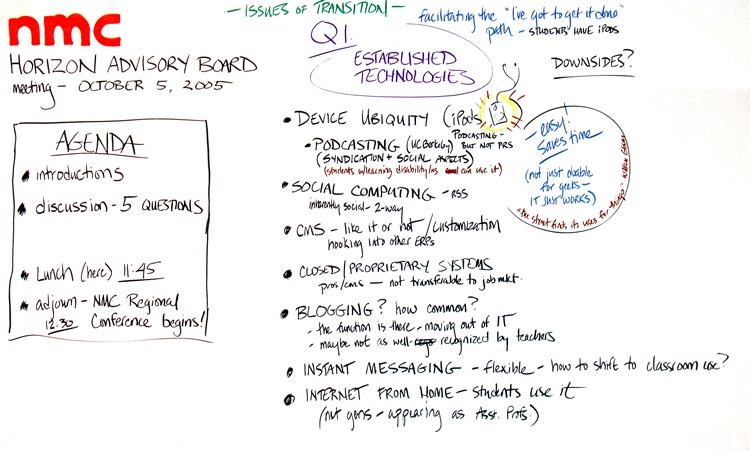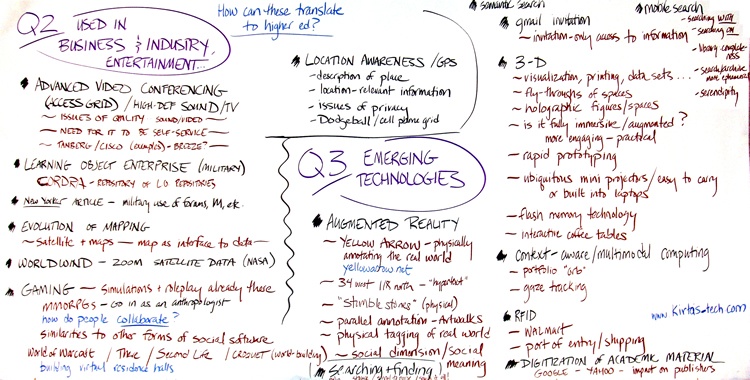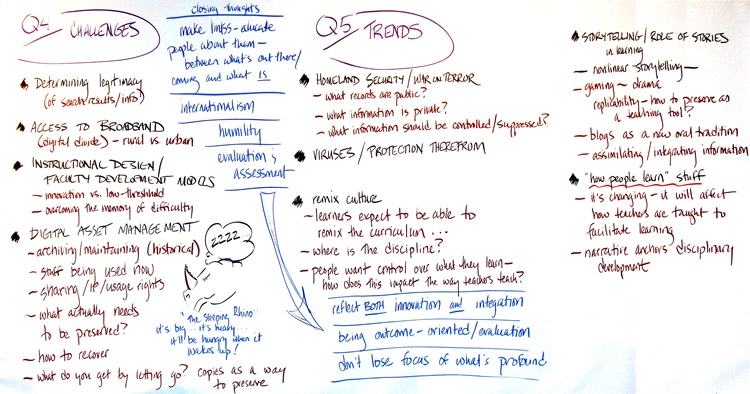The Advisory Board has been actively entering responses to the project's five research questions in the Sandbox, work which both informed and was extended at the Horizon Project Advisory Board meeting October 5.
At that meeting, held in conjunction with the NMC's New England Regional Conference at Yale University, the Advisory Board engaged in an energetic discussion around all five research questions, and added a number of new items to the responses here on the wiki.
As new items or points were made, Malcolm Brown added each to the wiki in the form of summary points for each of the questions. Phil Long posted these comments about the meeting on his blog.
Q1. What would you list among the established technologies that colleges and universities should all be using broadly today to support or enhance teaching, learning, or creative expression? Of special interest are technologies that are currently used by students (IM, blogging, etc.), as well as those that are in place (or about to be) in education whether we "like it or not" (CMS, for example). Podcasting, which is finding its way into some institutions already, captured the group's interest for its ease of use.
Q2. What technologies that have a solid user base in consumer, entertainment, or other industries should colleges and universities be actively looking for ways to apply? Looking to industry for examples of technologies that could be applied to education, the group identified a few that take advantage of high bandwitdh (video conferencing, massively multiplayer online gaming). Mapping technologies also came to mind.
Q3. What are the key emerging technologies you see developing to the point that colleges and universities should begin to take notice during the next 3 to 5 years? What institutions or companies are the leaders in these technologies? Moving ever closer, technologies like augmented reality, 3-D visualization and printing, and context-aware computing, all of which made appearances in previous editions of the Horizon Report, continue to tantalize us. Even closer, perhaps, are technologies for searching and finding.
Q4. What do you see as the key challenge(s) related to teaching, learning, or creative expression that colleges and universities will face during the next 5 years? The issue of access is still present, but has shifted from access to technology or to the internet in general to a question of access to broadband internet, which is becoming increasingly necessary for many other technologies. Digital asset management also struck a chord with the group as a significant challenge that many institutions are beginning to face.
Q5. What trends do you expect to have a significant impact on the ways in which colleges and universities approach their core missions of teaching and research? The group considered current trends like "remix culture," which refers to the way that people combine digital works to create new ones, and the growing role of storytelling in learning. Another trend that came up is the increasing emphasis on homeland security, which seems likely to have far-reaching impact on technology and education.
The meeting closed with an opportunity for each person present to share some closing thoughts. These focused on the importance of integrating technology effectively, as opposed to embracing the new merely because it is new; on evaluation and assessment, which is as challenging as it is critical to education; and on the value of forging links – between new and existing technologies, between people, and between nations.


